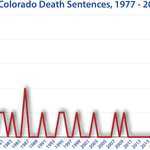
State & Federal
Colorado

History of the Death Penalty
The first execution in Colorado was the hanging of John Stoefel in 1859. All executions were carried out by hanging until 1934, when the state adopted lethal gas as its new execution method. Colorado switched to lethal injection in 1988 before abolishing the death penalty in March 2020.
Famous Cases
Perhaps the most famous death penalty cases in Colorado are two that did not result in death sentences.
On August 7, 2015, after a more than six-month trial that cost Colorado taxpayers more than $5 million, an Aurora, Colorado jury sentenced James Holmes to life in prison without the possibility of parole for a 2012 movie theater shooting that killed 12 people and injured dozens more. The jury said they could not reach a unanimous decision on Holmes’ sentence, an outcome that resulted in a sentence of life without parole. Holmes had offered to plead guilty in exchange for a sentence of life without parole, but the prosecution rejected the plea. Holmes then pleaded not guity by reason of insanity. All of the mental health experts agreed that Holmes would not have committed the killing but for his mental illness, but disagreed on whether he could appreciate the criminality of his conduct. The jury rejected the insanity defense and convicted him of all charges, but spared him the death penalty. After the trial, jurors said that the prosecution had not persuaded three of the jurors to impose death.
Several months later, a Denver jury returned a life sentence in the capital trial of Dexter Lewis in the stabbing deaths of 5 people in a Denver bar in 2012. After less than 3 hours of deliberation, the jury determined that the aggravating factors relating to the killing did not outweigh Lewis’ mitigating evidence detailing the extensive history of abuse and neglect in his upbringing, including chronic alcohol abuse by his mother while she was pregnant and nearly daily beatings when he was a child. The defense also presented mental health evidence of the long-term effects of severe child abuse.
Notable Exonerations
On January 7, 2011, Colorado Governor Bill Ritter granted a full and unconditional posthumous pardon to Joe Arridy, who had been convicted and executed as an accomplice to a murder that occurred in 1936. The pardon came 72 years after Arridy’s execution and is the first such pardon in Colorado history. A press release from the governor’s office stated, “[A]n overwhelming body of evidence indicates the 23-year-old Arridy was innocent, including false and coerced confessions, the likelihood that Arridy was not in Pueblo at the time of the killing, and an admission of guilt by someone else.” The governor also pointed to Arridy’s intellectual disabilities. He had an IQ of 46 and functioned like a toddler. The governor said, “Granting a posthumous pardon is an extraordinary remedy. But the tragic conviction of Mr. Arridy and his subsequent execution on Jan. 6, 1939, merit such relief based on the great likelihood that Mr. Arridy was, in fact, innocent of the crime for which he was executed, and his severe mental disability at the time of his trial and execution. Pardoning Mr. Arridy cannot undo this tragic event in Colorado history. It is in the interests of justice and simple decency, however, to restore his good name.”
Notable Clemencies
On March 23, 2020 — the same day that he signed the death-penalty repeal bill into law — Governor Jared Polis commuted the sentences of the state’s three death-row prisoners to life without possibility of parole. Polis refused to identify the the prisoners by name in the clemency orders, referring to them only by their Colorado Department of Corrections offender numbers. He said his acts of clemency were not based on humanitarian concerns, but “to reflect what is now Colorado law.” The commutations, he said, “are consistent with the abolition of the death penalty in the State of Colorado, and consistent with the recognition that the death penalty cannot be, and never has been, administered equitably in the State of Colorado.”
All three prisoners on Colorado’s death row were African Americans and all had attended Aurora High School:
1) Nathan Dunlap was condemned for shooting and killing four people at a Chuck E. Cheese restaurant. On May 22, 2013, Governor John Hickenlooper issued an Executive Order granting an indefinite stay of execution to Dunlap, who was facing execution that August. The governor’s statement accompanying this reprieve said “If the State of Colorado is going to undertake the responsibility of executing a human being, the system must operate flawlessly. Colorado’s system for capital punishment is not flawless.” The governor underscored that his decision to grant a reprieve — which has been construed as a moratorium on executions in the state — was because of larger objections to the death penalty, and that he was not granting clemency to Dunlap.
2) Sir Mario Owens was convicted and received a jury’s death determination in 2008 for the murder of a young couple, Javad Marshall-Fields and his fiancee, Vivian Wolfe. The victims were prosecution witnesses in a murder trial involving Owens.
3) Robert Ray ordered the murders committed by Sir Mario Owens. The victims, Javad Marshall-Fields and Vivian Wolfe, were witnesses in his pending murder trial.
Milestones in Abolition and Reinstatement
Colorado abolished the death penalty in 1897 and reinstated it in 1901. After the U.S. Supreme Court struck down existing death penalty statutes in Furman v. Georgia in 1972, Colorado reintroduced capital punishment in the state effective January 1, 1975.
In 2009, the Colorado House of Representatives passed a death penalty abolition bill by a 33 – 32 vote. The bill failed in the state Senate by a 17 – 18 vote. The bill would have shifted death penalty prosecution funds to the Colorado Bureau of Investigation for the purpose of solving cold cases. Officials estimated that abolishing the death penalty would have saved the state approximately $1 million a year. There were about 1,400 unsolved murder cases in Colorado at the time, but the Colorado Bureau of Investigations cold case unit has only one staff member. Proponents claimed that the $1 million could have added eight people to that unit.
In 2020, Colorado abolished the death penalty. The bill passed the Senate by a 19 – 13 vote on January 30, and the House by a 38 – 27 vote on February 26. Governor Jared Polis signed the bill into law on March 23, 2020 and commuted the sentences of the three prisoners on the state’s death row.
Other Interesting Facts
The last person executed in the United States before the U.S. Supreme Court declared existing death-penalty laws unconstitutional in Furman v. Georgia in 1972 was Luis José Monge, who was put to death in the gas chamber on June 2, 1967. It took more than ten-and-a-half years before another execution was carried out in the U.S., when Utah executed Gary Gilmore by firing squad on January 17, 1977.
Between Colorado’s reinstatement of capital punishment in 1975 and its abolition of the death penalty in 2020, Colorado executed only one person, Gary Davis on October 22, 1997.
Until July 2011, the Colorado DOC had as a matter of policy automatically assigned death-sentenced prisoners to administrative segregation, the highest-security classification, which critics refer to as solitary confinement. The DOC also required that death-sentenced prisoners be assigned to the state’s dedicated “supermax” prison, Colorado State Penitentiary (CSP), in which all 734 prisoners were isolated, locked down 23 hours a day, and denied outdoor exercise. At CSP, prisoners’ only opportunity for out-of-cell recreation was one hour in a separate concrete-walled cell that contains a pull-up bar.
Prison officials usually maintain that with good behavior, “supermax” prisoners can earn their way to general population facilities, where prisoners can go outdoors and enjoy additional privileges. Death-row prisoner Nathan Dunlap, however, had not been confined to “supermax” because of any violent or disruptive conduct in prison and despite his good behavior in “supermax,” he was not eligible to “earn” his way out.
Mr. Dunlap filed a lawsuit and acted as his own attorney until ACLU took over the lawyering in 2010 and reached a settlement with the DOC.
Under the terms of the settlement, Mr. Dunlap was moved from CSP to the Sterling Correctional Facility, where he remained in solitary confinement but was afforded the opportunity to exercise five days a week in an area open to the sky and elements — an area twice as large as the exercise rooms he had used for 15 years at CSP. The DOC also chose to transfer the two other Colorado death row inmates to the Sterling Correctional Facility.
For additional information, see M. Radelet, The History of the Death Penalty in Colorado, University Press of Colorado, January 2017; J. Ingold, A history of the death penalty in Colorado, Denver Post blogs, The Rap Sheet (March 23, 2012).
Resources

Colorado Execution Totals Since 1976
News & Developments
News
Jan 19, 2024
Department of Justice Decides Against Seeking Federal Death Penalty in Colorado Club Q Mass Shooting
On January 16, 2024, the United States Department of Justice (DOJ) announced that prosecutors reached a plea deal with Anderson Aldrich, the individual responsible for killing five and wounding dozens of others in the November 19, 2022, shooting of Colorado’s Club Q, an LGBTQ+ bar in Colorado Springs. The United States Attorney’s Office“alleges that Aldrich committed this attack because of actual or perceived sexual orientation and gender identity of any person.”…
Read MoreNews
Aug 30, 2023
Former Pro-Death Penalty District Attorney Explains Why He Now Supports Abolition and Fears Political Promises to Expand Use of the Death Penalty
Former Denver Chief Deputy District Attorney Craig Silverman recently wrote about why he changed his mind about supporting the death penalty and expressed new fears regarding its future use. His op-ed was published on August 29, 2023 in the Colorado Sun. Mr. Silverman writes that capital punishment was a prominent issue in his campaign for Denver District Attorney, and he himself prosecuted death penalty cases and publicly supported its use. But he writes that he now has…
Read MoreNews
Apr 14, 2020
New Discussions with DPIC Podcast: Denver District Attorney Beth McCann on Criminal Justice Reform and Colorado’s Death-Penalty Repeal
In the April 2020 episode of Discussions with DPIC, Denver District Attorney Beth McCann (pictured) speaks with Death Penalty Information Center Executive Director Robert Dunham about Colorado’s repeal of…
Read MoreNews
Apr 13, 2020
News Brief — Prosecutors Drop Death Penalty in Last Remaining Colorado Capital Prosecution
NEWS (4/13/20) — Colorado: Prosecutors in Colorado Springs have dropped the death penalty in their murder case against Marco Garcia-Bravo in the shooting death of two high school students, the last remaining capital prosecution in Colorado since the state abolished the death penalty on March 23. Parroting language used by Adams County prosecutors when they dropped the death penalty against Dreion Dearing on March 30 in the…
Read MoreNews
Apr 01, 2020
Colorado District Attorneys Drop One Capital Prosecution, Continue a Second, After State Abolishes Death Penalty
After ignoring health risks posed by lengthy court proceedings during the coronavirus pandemic and facing criticism that a capital prosecution following the state’s abolition of capital punishment would amount to a politically partisan waste of taxpayer dollars, prosecutors in Adams County, Colorado have announced that they will drop the death penalty in a high-profile case involving the killing of a sheriff’s…
Read More


